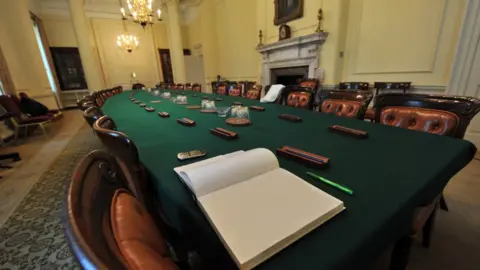The cabinet: What is it and what does it do?
 BBC
BBCHand-picked by the prime minister, the cabinet is tasked with the important business of - well - running the country.
Here's what you need to know about the cabinet and how it works.

It is the prime minister's top team
The cabinet is usually made up of around 30 MPs and can include members of the House of Lords.
Cabinet members are known as ministers, or in some cases, secretaries of state, depending on the job.


Each minister looks after specific things
These range from issues like education and culture. The finance minister - who goes by the title chancellor of the exchequer - decides how much money you will be taxed and where that money will be spent. The home secretary looks after UK borders and policing.
There's a shadow cabinet too. They are chosen by the Leader of the Opposition to mirror the cabinet in government. So there's a shadow business secretary and home secretary.


They are chosen and 'reshuffled' by the prime minister
Top jobs are often given to the PM's supporters. Cabinet members are usually announced on a PM's first day in office.
It's called a "reshuffle" when lots of the ministers are moved around, promoted or fired. Ministers can be moved between different departments, so for instance they could move from transport to the environment, food and rural affairs.


They don't need to be an expert
An MP doesn't need to have direct experience to be a minister in a particular area. For example, the health secretary doesn't need to have worked as a doctor or nurse.
Instead they take advice and decide what the department does. They take into account how much money needs to be spent, whether it's what the government promised they'd do, and how it affects voters.


Then it's up to other people to get it done
Each department works with civil servants - people who aren't elected politicians or loyal to any political party. They work to make the government's plans happen.


There's a special room - and table - for meetings in 10 Downing Street
The cabinet usually meets on a Tuesday morning - although they don't meet when parliament isn't sitting or when the prime minister isn't available.
They sit around a long table covered in deep green felt and there's a carved chair for every minister. The PM sits in the middle. The closer someone sits to the prime minister, the more important they are seen to be.


Cabinet ministers get an extra salary on top of their MP pay cheque
Ministers in the House of Commons receive their MP's salary and an additional sum of around £67,000 for being a cabinet minister, according to data from the Cabinet Office.
However, the post also comes with big risks. If things go wrong in their department, ministers are usually expected to take the fall and resign.

